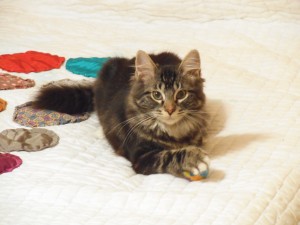Q: My daughter rescued a litter of 4 kittens which we hand raised. Each kitten went to a daughter and I kept the smallest which I had to bottle feed. We have all stayed in-touch about our kittens’ behaviors. The one behavior that all these kittens share is biting…. Most of the time not hard enough to break the skin. Can you please explain this behavior and how to discipline and discourage this behavior? – Melissa
A: It is not uncommon for kittens to bite. All kittens will bite, especially if people play with their hands or there is not enough active stimulation versus playing with interactive toys – feather and pole toys. However, many kittens who are weaned too early, who are bottle fed and/or do not have access to play with littermates tend to bite more and can show some signs of play aggression (inappropriate play, not retracting claws and so on). Often this occurs more often in singleton kittens — kittens who are the only animals in the house (You did not mention when they were separated). This is worsened if they are alone for most of the day. The socialization time for kittens to perfect play (i.e., “hunting”) skills is between 5 weeks and 4 months. Kittens learn how to play by playing with each other and with their mom. They learn how to retract their claws and bite softly. Many kittens are given away at 7 or 8 weeks. Their play skills aren’t perfected yet.
Some tips to handle biting in kittens are:
1) Don’t play with your kitten with your hands or fingers.
2) Always redirect by enticing the kitten with other toys that are interactive. See How to Play with Your Cat.
3) If your kitten attacks your hand or bites it, go limp and be passive. Either distract the kitten with another movement until s/he lets go, or slowly move your hand out of the way. If you pull your hand away, a cat’s natural instinct is to latch on. Kittens also like movement, so by being still, you will make yourself boring and your kitten’s interest will go elsewhere.
4) Free feed kittens and cats. Always make sure your kitten has access to food at all times and is well fed.
5) Always have a few small toys out and rotate them to keep them interesting.
6) If your kitten looks as if s/he is wanting to play or attack you, redirect to interactive play before the attack, followed by a few treats or small meal.
7) Remove eye-contact and avert your gaze or glance away if your kitten looks like s/he wants to play attack you. Direct eye-contact is unnerving to cats and can be a challenge. Averting your gaze when your kitten looks as if s/he may bite will often prevent attacks and biting.
8) Never reprimand. This includes blowing on your kitten’s face, hitting or tapping your kitten’s nose, yelling at, or pinning or scruffing him/her. This will not teach your kitten to play gently and will usually make it much worse and/or teach your kitten to fear you, which will damage the relationship and create other behavioral problems.
Copyright © Alana Stevenson 2014
See Also:
My cat bites me, what can I do?
What makes some kittens fearful?
Alana Stevenson can be reached through her website AlanaStevenson.com.

I have kitten 6 week old this one week she keep biting why?? She always keep run away from us n never let us pet her (not even can touch ) why ??